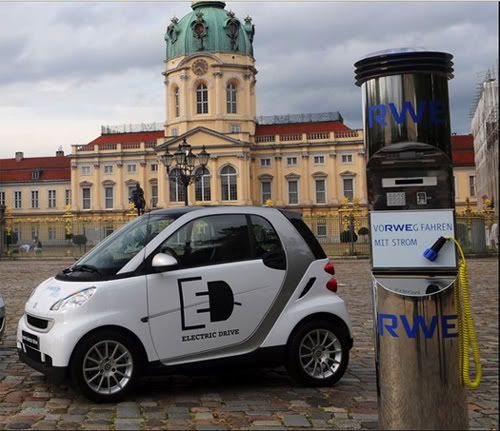
In the largest fieldtest to date, the German electric utility RWE is teaming up with Daimler to test EV charging aparatus with 100 Smart electric test vehicles driving around Berlin today. RWE will be installing 500 such charging station around Berlin, at workplaces and in public parking areas, but also, in an unusual development, at customers homes.
To pay the utility for electrons there will be an automated exchange of data between a special in-car communication system and the intelligent electricity charging points providing effective, customer friendly and convenient everyday operation.
Automatic fastcharge stations like these being developed by RWE or those developed by Coulomb Technologies here in the US will be an important part of EV deployment. Many EVs are coming by 2010, as we end the age of oil. Increasingly, charging station infrastructure is under development worldwide. Utilities are finding that EVs can contribute to grid stability.
 Like PG&E in California last year with its testing of a Prius plug-in hybrid, the German utility RWE is interested in vehicle-to-grid integration: having the on-board lithium-ion packs able to store surplus electricity when demand is low and able to feed it back in the network when demand is high.
Like PG&E in California last year with its testing of a Prius plug-in hybrid, the German utility RWE is interested in vehicle-to-grid integration: having the on-board lithium-ion packs able to store surplus electricity when demand is low and able to feed it back in the network when demand is high.
V2G is an excellent way to ensure base load storage for solar and wind power, and both Germany and California are adding more renewables into their energy mix.
Daimler's electric vehicles will be powered by lithium-ion batteries developed by Tesla Motors, the California startup that bought the EV back from the dead with this years Roadster, widely credited with galvanizing GMs development of the Volt.
It was only this morning that Daimler announced a 16% drop in their Mercedes-Benz luxury cars and SUV sales, while their tiny Smart grew 29% percent - of course, partly that's because the US market was supplied the fuel-efficient Smarts for the first time this Spring. A month or so ago Mercedes said they were getting out of the gasoline car business entirely within 7 years causing quite a stir in the green blogosphere. With this move, they are taking yet another step towards that fine goal.
For Matternetwork


